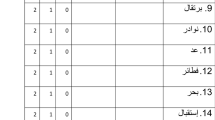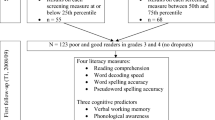Abstract
The purpose of the study was to examine the nature of language, memory, and reading skills of bilingual students and to determine the relationship between reading problems in English and reading problems in Portuguese. The study assessed the reading, language, and memory skills of 37 bilingual Portuguese-Canadian children, aged 9–12 years. English was their main instructional language and Portuguese was the language spoken at home. All children attended a Heritage Language Program at school where they were taught to read and write Portuguese. The children were administered word and pseudoword reading, language, and working memory tasks in English and Portuguese. The majority of the children (67%) showed at least average proficiency in both languages. The children who had low reading scores in English also had significantly lower scores on the Portuguese tasks. There was a significant relationship between the acquisition of word and pseudoword reading, working memory, and syntactic awareness skills in the two languages. The Portuguese-Canadian children who were normally achieving readers did not differ from a comparison group of monolingual English speaking normally achieving readers except that the bilingual children had significantly lower scores on the English syntactic awareness task. The bilingual reading disabled children had similar scores to the monolingual reading disabled children on word reading and working memory but lower scores on the syntactic awareness task. However, the bilingual reading disabled children had significantlyhigher scores than the monolingual English speaking reading disabled children on the English pseudoword reading test and the English spelling task, perhaps reflecting a positive transfer from the more regular grapheme phoneme conversion rules of Portuguese. In this case, bilingualism does not appear to have negative consequences for the development of reading skills. In both English and Portuguese, reading difficulties appear to be strongly related to deficits in phonological processing.
Similar content being viewed by others
References
Barik, H. C. & Swain, M. (1975). Three-year evaluation of a large scale early grade French immersion program: The Ottawa study,Language Learning 25: 1–30.
Cummins, J. (1979). Linguistic interdependence and the educational development of bilingual children,Review of Educational Research 49: 222–251.
Cummins, J., Swain, M., Nakajima, K., Handscombe, J., Green, D. & Tran, C. (1984). Linguistic interdependence among Japanese and Vietnamese immigrant students. In: C. Rivera (ed.),Communicative competence approaches to language proficiency assessment: Research and application (pp. 60–81). England: Multilingual Matters Ltd.
Daneman, M. & Carpenter, P. A. (1980). Individual differences in working memory and reading,Journal of Verbal Learning and Verbal Behavior 19: 450–466.
Ganschow, L., Sparks, R. L., Javorsky, J., Pohlman, J. & Bishop-Marbury, A. (1991). Identifying native language difficulties among foreign language learners in college: A ‘foreign’ language learning disability?,Journal of Learning Disabilities 24: 530–541.
Geva, E. & Siegel, L. S. (1991). The role of orthography and cognitive factors in the concurrent development of basic reading skills in bilingual children. Unpublished manuscript.
Gregory, S. & Lee, S. (1986). Psychoeducational assessment of racial and ethnic minority groups: Professional implications,Journal of Counseling and Development 64: 635–637.
Jastak, S. & Wilkinson, G. S. (1984).The Wide Range Achievement Test — Revised. Wilmington, DE: Jastak Associates.
Lambert, W. E. & Tucker, G. R. (1972).Bilingual education of children. Rowley, MA: Newbury House.
Liberman, I. Y., Shankweiler, D., Fischer, F. W. & Carter, B. (1974). Explicit syllable and phoneme segmentation in the young child,Journal of Experimental Child Psychology 18: 201–210.
Lindgren, S. D., De Renzi, E. & Richman, L. C. (1985). Cross-national comparisons of developmental dyslexia in Italy and the United States,Child Development 56: 1404–1417.
McDougall, A. & Bruck, M. (1976). English reading within the French immersion program: A comparison of the effects of the introduction of English reading at different grade levels,Language Learning 26: 37–43.
Ribeiro, J. L. (1980). Testing Portuguese immigrant children: Cultural patterns and group differences in responses to the WISC-R. In: D. P. Macedo (ed.),Issues in Portuguese bilingual education (pp. 89–112). Cambridge, MA: National Assessment and Dissemination Center for Bilingual Education.
Rosier, P. & Farella, M. (1976). Bilingual education at Rock Point: Some early results,TESOL Quarterly 10: 379–388.
Siegel, L. S. (1988). Evidence that IQ scores are irrelevant to the definition and analysis of reading disability,Canadian Journal of Psychology 42: 201–215.
Siegel, L. S. (1993). The cognitive basis of dyslexia. In: R. Pasnak & M. L. Howe (eds.),Emerging themes in cognitive development, Vol. 2:Competences (pp. 33–52). New York: Springer Verlag.
Siegel, L. S. & Ryan, E. B. (1988). Development of grammatical sensitivity, phonological and short-term memory skills in normally achieving and learning disabled children,Developmental Psychology 24: 28–37.
Siegel, L. S. & Ryan, E. B. (1989a). The development of working memory in normally achieving and subtypes of learning disabled children,Child Development 60: 973–980.
Siegel, L. S. & Ryan, E. B. (1989b). Subtypes of developmental dyslexia: The influence of definitional variables,Reading and Writing: An Interdisciplinary Journal 1: 257–287.
Stanovich, K. E. (1988a). Explaining the differences between the dyslexic and garden variety poor reader: The phonological-core variance-difference model,Journal of Learning Disabilities 21: 590–604, 612.
Stanovich, K. E. (1988b). The right and wrong places to look for the cognitive locus of reading disability,Annals of Dyslexia 38: 154–177.
Swain, M., Lapkin, S., Rowen, N. & Hart, D. (1990). The role of mother tongue literacy in third language learning,Vox 4: 111–121.
Verhoeven, L. T. (1990). Acquisition of reading in a second language,Reading Research Quarterly 25: 90–114.
Wagner, D. A., Spratt, J. E. & Ezzaki, A. (1989). Does learning to read in a second language always put the child at a disadvantage? Some counter evidence from Morocco,Applied Psycholinguistics 10: 31–48.
Willig, A. C. (1985). A meta-analysis of selected studies on the effectiveness of bilingual education,Review of Educational Research 55: 269–317.
Wolfram, W. (1983). Test interpretation and sociolinguistic differences,Topics in Language Disorders 3: 21–34. Aspen Systems Corporation.
Woodcock, R. W. (1973).Woodcock Reading Mastery Tests. Circle Pines, MN: American Guidance Services.
Author information
Authors and Affiliations
Rights and permissions
About this article
Cite this article
Da Fontoura, H.A., Siegel, L.S. Reading, syntactic, and working memory skills of bilingual Portuguese-English Canadian children. Read Writ 7, 139–153 (1995). https://doi.org/10.1007/BF01026951
Issue Date:
DOI: https://doi.org/10.1007/BF01026951




